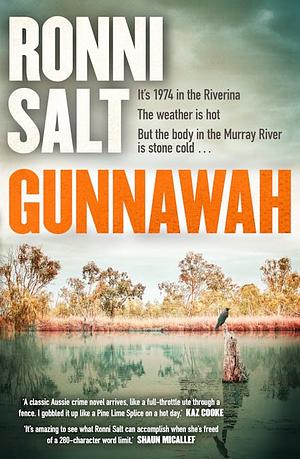
The blurb:
When nineteen-year-old farmgirl Adelaide Hoffman applies for a cadetship at the Gunnawah Gazette, she sees it as her ticket out of a life too small for her. Its owner, Valdene Bullark, sees something of the girl she once was in young Adelaide.
Val puts Adelaide straight to work. What starts as a routine assignment covering an irrigation project soon puts Adelaide on the trail of a much bigger story. Water is money in farming communities, and when Adelaide starts asking questions, it's as if she's poked a stick in a bull ant's nest. Violence follows. Someone will do whatever it takes to stop Adelaide and Val finding out how far the river of corruption and crime runs.
Shady deals. Vested interests. A labyrinth of lies. It seems everyone in Gunnawah has a secret to keep. But how many want to stop Adelaide dead?
First there was Scandi noir; lately, between Jane Harper and Chris Hammer, there’s a kind of Australian noir thing going on.
I don’t know if Gunnawah counts as ‘noir’ or not—genre lines get a little blurry for me—but I like a good crime novel, and Gunnawah is a pretty good one.
First, the setting. I grew up in the 70s, though not in the geographic area where Salt has set the book (though I did live around that patch in the 80s), and oh boy, does this ring true for me. I was young then, but the setting and characters still feel familiar. I can absolutely picture Valdene, and Kon and Tina’s café, for instance.
The test of a realistic crime novel is how well it hangs together in the end: does the solution make sense, do there need to be deus ex machina-like coincidences or curveballs to make it all add up? For the most part, Gunnawah does work: people behave as their characterisation paints them, nobody makes a small throwaway comment that prompts another character to have a lightbulb moment1, nobody’s a Holmes-like super-genius.
But there is one curveball that shows up at the end, just to help neaten the bow. It is referenced earlier on and, while the reference does feel a bit shoehorned in, it’s coming from a character who’d know, so it’s not as egregious as some. And you do have to cast your mind back a bit to simpler (i.e. less ‘information on anything at your fingertips’) times, when it was reasonable for a fairly sheltered farm kid not to know what ::ahem:: certain agricultural products look like.
The plot’s ingenious and rooted in the actual history (more or less) of the area, bringing in some actual historical people like Gough Whitlam and Al Grassby. It’s not too fast-paced—there are some time skips here and there, which matches up to the pace of a place like Gunnawah—and the characters are all memorable. An enjoyable read.
1On way too many police procedurals, there’s a moment like:
Sidekick: Well, at least you didn’t have to teach a busker how to tune his ukulele today.
Detective/cop: What did you just say?
Sidekick: At least you didn’t have to teach a busker how to tune his ukulele—
Detective/cop: Ukulele?!? ::gasp:: I know who the killer is!
Drives me bananas. The key word is usually obviously shoved into conversation just so the main character can have that gasp-lightbulb moment, and that obviousness renders the whole conversation clunky.
Started: 23 April 2025
Finished: 26 April 2025
Back home.
More books.